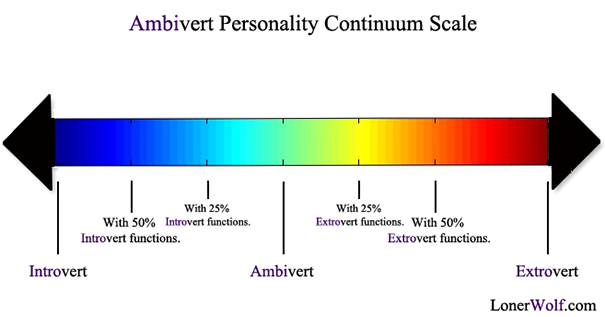Posted on September 23 2017
Every day, we experience people with different personalities and different demeanours, but one of the most noticeable things about a person, is how well they deal with other people. The classification associated with this is categorized into extroverts and introverts. Most think extroverts are outgoing, sociable, adventurous and the never ending life of the party, whereas, introverts are perceived as shy and calmly reserved.
This is not entirely a lie, but it’s not the truth either. Let's go into the psychology of what makes someone an introvert or extrovert. Do note, that I am just an intern writer for Psych2Go so my information may not be entirely accurate. However, I did my best in citing and referencing research that I know of.
Let's begin.
The thing that defines extroverts and introverts are where they get their energy from. This so called ‘energy’ can’t exactly be defined into biological terms, but it represents a psychological variable that is hard to understand. A definition will not help the understanding of energy, but going through examples of how energy can be drained or gained, clears the some of the mystery around it.
Extroverts: gain energy from being around other people, and are drained of energy by being alone.
Introverts: gain energy from being alone, are drained of energy when around other people.
This means that introverts are not necessarily shy, they might be great at socialising but it just tires them after long periods of time. At the same time, extroverts might not hate being alone, they might find it very interesting, but it just drains their energy, when there is no one around them to gain energy from.
The Spectrum
Us as humans tend to classify people into different groups. This is because we don’t want to see the messiness or lose strings of the world, and would like everything to be neat and tidy. That’s why many people will ask: “Do you think you’re an extrovert, or an introvert?”
In psychological terms, this question rarely makes sense, because extroversion and introversion are the two extremes along a spectrum of other degrees that lie between these two.

So, there are rarely people who are full extroverts or introverts, most of us are somewhat a mix of them in between.
Eysenck’s Theory
Along with the theory that the difference between extroverts and introverts are where they lose of gain energy from, there is another theory developed in the 60s by Hans Eysenck’s.
Eysenck believed that the difference between extroverts and introverts was their level of arousal. This means how stimulated and responsive they become to their surroundings.
He proposed that the rate of arousal for extroverts is tremendously lower, so they must seek more stimulating activities to be at the normal state of arousal. This is why they seek adventure and the company of others.
On the other hand, introverts have a higher rate of arousal, so it doesn’t take as much to raise it to the normal state. This is why the adventure extroverts pursue may be overwhelming for them, so they would rather be alone.

Now that you know the true nature of extroverts and introverts, where do you think you are along this spectrum?
From: http://psych2go.net/the-psychology-of-introversion/
Sources:
http://lonerwolf.com/wp-content/uploads/2012/10/ambivert-personality-continuum-scale.png
https://blog.bufferapp.com/wp-content/uploads/2013/08/E-I-activation.jpg
https://www.psychologytoday.com/collections/201207/introverts-extroverts
http://www.fastcompany.com/3016031/leadership-now/are-you-an-introvert-or-an-extrovert-and-what-it-means-for-your-career
http://denvercounseling.com/wp-content/uploads/2013/03/extrovert-and-introvert-boss.jpg